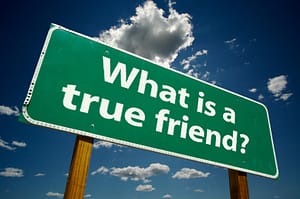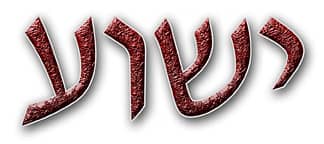I always have mixed emotions about Thanksgiving, because on the one hand, at its heart are two of my most favorite things: family and food! But on the other hand, it not only signals the beginning of the commercial winter holiday season (in which we are bombarded by merchandising and inducements to unnecessarily part with our finances), but, to a degree, it’s not really my holiday. I am only a second-generation American-born Jew, so before WWII, my ancestors knew nothing of the American Thanksgiving holiday (though it is indirectly related to our own Autumn Feast, Sukot). So, while I enjoy Thanksgiving on a familial, individual, and American level (because I am very thankful indeed for this country), it also reminds me that I—as my ancestors have been for centuries—am a stranger in a strange land… a man caught between worlds. Read more
 Most of us toss around the word “friend” as casually as we lob our dirty socks toward the laundry basket. Friends—we think—are buddies, chums, or pals; people we “hang out” and “do stuff” with, or know from work or school. We call, text, and Facebook with their disembodied avatars; we meet them for lunch, accompany them on errands, and invite them over for dinner. We “go to church” with them, attend Bible studies, partake in fellowship meals—even pray, cry, laugh, and perform ministry together. But on what basis can we consider all (or any) of these acquaintances true friends? Surely, there must be more than mutual, interactive enjoyment, the sharing of common interests, or mere situational convenience. By what standard should we call one another “friend”? Read more
Most of us toss around the word “friend” as casually as we lob our dirty socks toward the laundry basket. Friends—we think—are buddies, chums, or pals; people we “hang out” and “do stuff” with, or know from work or school. We call, text, and Facebook with their disembodied avatars; we meet them for lunch, accompany them on errands, and invite them over for dinner. We “go to church” with them, attend Bible studies, partake in fellowship meals—even pray, cry, laugh, and perform ministry together. But on what basis can we consider all (or any) of these acquaintances true friends? Surely, there must be more than mutual, interactive enjoyment, the sharing of common interests, or mere situational convenience. By what standard should we call one another “friend”? Read more
![4847036-date-palm-plantation-at-oasis-near-dead-sea[1]](https://mlqmsuiltnh3.i.optimole.com/cb:6w4K.3177d/w:80/h:80/q:mauto/rt:fill/g:ce/f:best/ig:avif/https://www.perfectword.org/wp-content/uploads/2011/10/4847036-date-palm-plantation-at-oasis-near-dead-sea1.jpg) What great nation is there that has a God so near to it, that He would command His people to party for seven days straight? Sukot, the final feast of the year, is a week-long, unabashed celebration of Adonai’s provision, protection and salvation. It’s simplicity and joy lends itself to an unparalleled revelation of Yeshua!
What great nation is there that has a God so near to it, that He would command His people to party for seven days straight? Sukot, the final feast of the year, is a week-long, unabashed celebration of Adonai’s provision, protection and salvation. It’s simplicity and joy lends itself to an unparalleled revelation of Yeshua!
Audio, which was available here from October 13-20, 2011, is no longer available here. Please go here instead. This teaching is part eleven of the 12-part series “Signs & Seasons,” a Scriptural exploration of Israel’s calendar.
For more about Sukot and Israel’s calendar
-
Rated 5.00 out of 5
Signs & Seasons (12-Part Series)
$99.95Original price was: $99.95.$39.95Current price is: $39.95. Sale!Select options This product has multiple variants. The options may be chosen on the product page -
Chag HaSukot (Feast of Temporary Dwellings)
$9.95Original price was: $9.95.$4.95Current price is: $4.95. Sale!Select options This product has multiple variants. The options may be chosen on the product page
The authority and power of the Scriptures rests solely on our belief that they are literally the written word of God. So what happens when we translate those God-inspired words from the languages in which they were originally written? Indeed, though many of us read the Bible effortlessly in our native English, English is certainly not the native tongue of Scripture. Though we may revere our English bibles as the infallible word of God, the fact is that Hebrew (or sometimes Aramaic, and Greek in the “New Testament”) is the original language of Scripture, and when we neglect it, we risk imposing our own flawed points of view on God’s word.
Though in large part, translators do a fine job retaining the essence of Scripture, there are times when English simply does not do a passage justice. Either through mistranslation due to bias or ignorance, or merely by the limitations of the receiving language, important details can become obscured, replaced by ideas from the reader’s experience or particular frame of reference. Read more

A: Thank you for your important question. I understand why you feel confused. Let me address each issue in turn, and then I will conclude with some comments and observations. Read more
Q: Hi Kevin, I ran across an article recently that was saying that we shouldn’t be celebrating the Festivals because we’re only supposed to do that in the Land in the place of His Name (Jerusalem, e.g. Deuteronomy 16:5-6). The author was saying it’s wrong to do this! Wow! What’s that about?
A: I’d like to see the article to find out exactly what his take is, but here’s mine: I wouldn’t say that it’s “wrong”—only that it’s impossible! Torah was given to Israel so that Israel could be Israel—and that includes possessing the Promised Land. There are no provisions for keeping Torah in Dispersion. On the contrary, Numbers 9:9-12, for example, gives instructions for someone who is on a journey at the time of Passover. It doesn’t say anything about keeping the Feast where he is (the implication being, outside the Land), but that he better be back in time to celebrate it a month later! Read more
Not only are the Scriptures the perfect Word of God—true, reliable, objective and solely authoritative—they are do-able. Though our view of Scripture is often distorted because we consider its teachings to be inapplicable, irrelevant, impractical, idealistic, unattainable, and especially unfathomable to uneducated minds, in reality, the Word of God is simple… and we can do it.
The Scriptures are simple and do-able because Adonai Himself has made His Word accessible. Not only are His commands not beyond our effortless reach, but they are near and even planted inside us. Mosheh states this unequivocally according to D’variym 30:11-14,
For this command which I am commanding you today, it is not too extraordinary for you, nor is it far off. It is not in the heavens, [leading you to] say, “Who will go up for us into the heavens, and get it for us, and cause us to hear it—that we may do it?” And it is not beyond the sea, [leading you to] say, “Who will pass over for us beyond the sea, and get it for us, and cause us to hear it—that we may do it?” For very near to you is the word (haDavar), in your mouth, and in your heart—to do it.
I have this stupid idea that if each of us can stop thinking about ourselves for one minute, and humbly read the Scriptures without imposing our own preconceived ideas, pet theologies and personal preferences on them, that we will agree on the plain, simple truth of the Word of God. In this fantasy world of mine (you know, the one in which I have stupid ideas), even so-called difficult passages of Scripture fail to hinder us, because we no longer stand to lose or gain anything except the ability to know and follow God’s pure and perfect Word. In my enchanted and magical wonderland, we as disciples of Messiah are wholly submitted to the principles and commands of Scripture—no matter what they say, how they make us feel, or the cost that they insist we incur. Read more
The Tainting of Torah, Part 2
Q: Kevin, I so want to obey our Adonai and be faithful to Torah and the rest of His Word, but I feel singly married because my husband, who loves God so much, still wants to go to our church on Sunday (he works on Saturday – Aargh!). Thank you.
A: It’s clear that you feel conflicted between your desire to be faithful to the Torah and your husband’s desire to continue in traditional Christianity. Obviously, it has reached a critical level if you are having feelings of being “singly married.” I empathize with your inner struggle—it is not easy to feel like you are being led by the Master in a way that is contrary to your spouse. That said, may I please make a suggestion that could not only help heal this growing rift in your marriage, but might draw you both closer to the ways of the Master? Trust your husband—who, in your own words, “loves God so much”—to lead you and care for you in this regard. Read more
Q: Dear Kevin, it seems to me there is an issue that Messianics need to resolve before it makes us crazy. On one hand, Scripture tells us that we are one in Messiah (Romans 12:5, Galatians 3:28), joint heirs (Ephesians 3:6), et cetera. On the other hand, there is the maxim, “to the Jew first, then to the Gentiles.” On the one hand, a doctrine of unity, on the other a doctrine of first- and second-class citizens. Does the maxim “to the Jew first” have any Scriptural basis? If so, how are we to understand it? What place is it to hold in the Messianic mindset? How do we reconcile these two apparently incompatible views?
A: The misperception and perpetuation of first- and second-class citizenship in the Messianic Jewish movement has resulted not only in its tragic fragmentation and the rise of aberrant theological offshoots, but in our near-complete ineffectiveness to fulfill our collective calling in Messiah. This is, therefore, an issue of monumental importance, and—I agree—needs to be resolved. The good news is that Scripture has our answer. Read more




